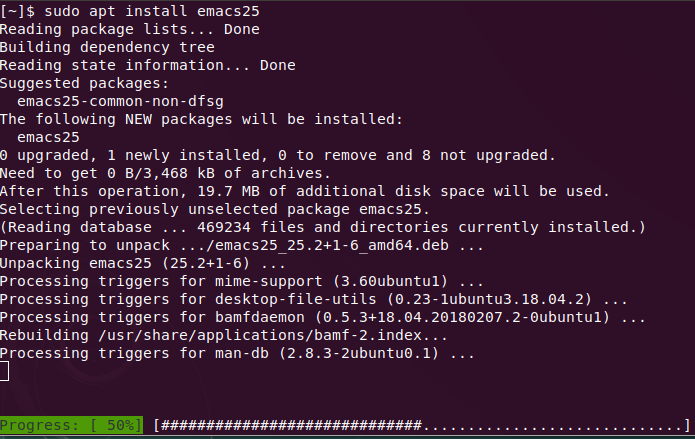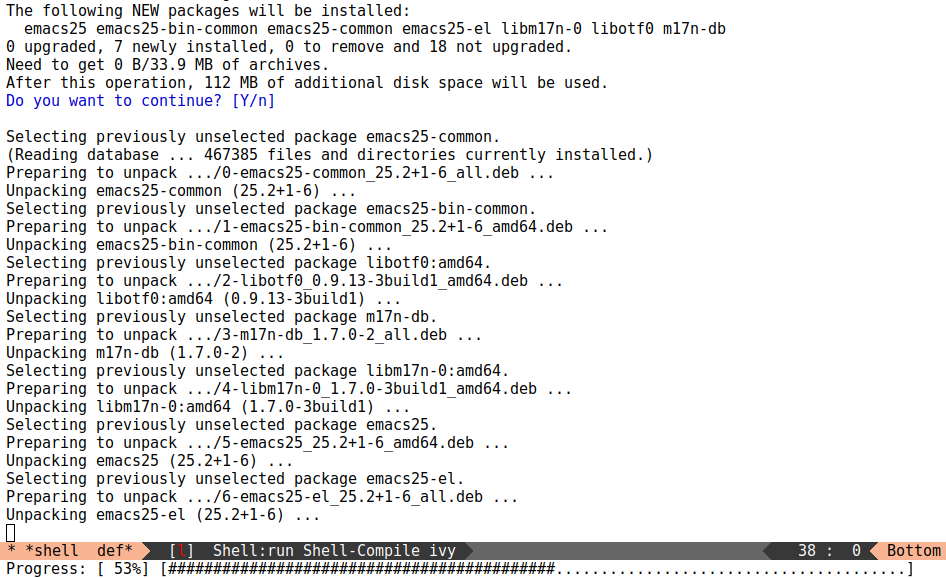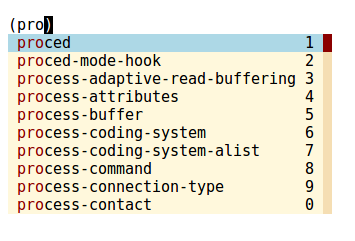24 Mar 2019
Intro
For a couple years now, I use M-x shell as my main shell. Recently, I have fixed one of
the minor annoyances that go along with using shell in Emacs. At least since Ubuntu 18.04, the
terminal "progress bar" feature, displayed below is non-optional:

It uses terminal escape codes to display the progress bar, and shell-mode can't handle them well,
so they clobber a lot of the output.
Initial work around
Previously, I was using this work around, since apt-get doesn't display the progress bar:
# sudo apt upgrade
sudo apt-get upgrade
Progress bar in the mode line
But typing 4 extra chars is hard. And apt-get will likely get these progress bars at some point as
well. So I spent around an hour of my weekend hacking an Elisp solution. Here is the code:
(advice-add
'ansi-color-apply-on-region
:before 'ora-ansi-color-apply-on-region)
(defun ora-ansi-color-apply-on-region (begin end)
"Fix progress bars for e.g. apt(8).
Display progress in the mode line instead."
(let ((end-marker (copy-marker end))
mb)
(save-excursion
(goto-char (copy-marker begin))
(while (re-search-forward "\0337" end-marker t)
(setq mb (match-beginning 0))
(when (re-search-forward "\0338" end-marker t)
(ora-apt-progress-message
(substring-no-properties
(delete-and-extract-region mb (point))
2 -2)))))))
(defun ora-apt-progress-message (progress)
(setq mode-line-process
(if (string-match
"Progress: \\[ *\\([0-9]+\\)%\\]" progress)
(list
(concat ":%s "
(match-string 1 progress)
"%%%% "))
'(":%s")))
(force-mode-line-update))
The solution will detect e.g. "\0337...Progress: [ 25%]...\0338", remove it from the shell buffer
and display "25%" in the mode line instead.
Use the Echo Area instead of the mode line
The above is a good enough solution specifically for apt(8), but not for the generic case. Let's
try to emulate how e.g. gnome-terminal handles these escape sequences. It takes sequences like
"\0337.*\0338" and displays them in the bottom of the window. Kind of like the Emacs Echo
Area. That's easy enough to do:
(defun ora-apt-progress-message (progress)
(message
(replace-regexp-in-string
"%" "%%"
(ansi-color-apply progress))))
Above, we use ansi-color-apply to get rid of any extra terminal escape codes. I decided to stay
with the Echo Area version instead of the mode line version. Here's how it looks like:

You can find all of the above code in my config.
Happy hacking!
05 Mar 2018
Git
I like Git. A lot. After years of use it has
really grown on me. It's (mostly) fast, (often) reliable, and (always)
distributed. For me, all properties are important, but being able to
do git init to start a new project in seconds is the best feature.
When it comes to working with Git day-to-day, a nice GUI can really
make a difference. In Emacs world, of course it's
Magit. Outside of Emacs (brr),
git-cola looks to be the most promising
one. If you're aware of something better, please share - I'm keeping a
list of suggestions for my non-Emacs using colleagues.
Ivy integration for Git
The main two commands in ivy
that I use for Git are:
counsel-git: select a file tracked by Gitcounsel-rg: grep for a line in all files tracked by Git, using
ripgrep as the backend.
There are many alternatives to counsel-rg that use a different
backend: counsel-git-grep, counsel-ag, counsel-ack,
counsel-pt. But counsel-rg is the fastest, especially when I have
to deal with Git repositories that are 2Gb in size (short explanation:
it's a Perforce repo with a bunch of binaries, because why not; and
I'm using git-p4 to interact with
it).
Using .ignore with ripgrep
Adding an .ignore file to the root of your project can really speed
up your searches. In my sample project, I went from 10k files to less
than 500 files.
Example content:
/TAGS
*.min.js*
/Build/Output/
/ThirdParty/
As you can see, both file patterns and directories are supported. One
other nifty thing that I discovered only recently is that you can use
ripgrep as the backed for counsel-git in addition to
counsel-rg. Which means the same .ignore file is used for both
commands. Here's the setting:
(setq counsel-git-cmd "rg --files")
And here's my setting for counsel-rg:
(setq counsel-rg-base-command
"rg -i -M 120 --no-heading --line-number --color never %s .")
The main difference in comparison to the default
counsel-rg-base-command is -M 120 which means: truncate all lines
that are longer than 120 characters. This is really helpful when Emacs
is accepting input from ripgrep: a megabyte long line of minified JS
is not only useless since you can't see it whole, but it will also
likely hang Emacs for a while.
Outro
I hope you found these bits of info useful. Happy hacking!
27 Dec 2017
I'd like to share a customization of
company-mode that I've
been using for a while. I refined it just recently, I'll explain
below how.
Basic setting
(setq company-show-numbers t)
Now, numbers are shown next to the candidates, although they don't do
anything yet:

Add some bindings
(let ((map company-active-map))
(mapc
(lambda (x)
(define-key map (format "%d" x) 'ora-company-number))
(number-sequence 0 9))
(define-key map " " (lambda ()
(interactive)
(company-abort)
(self-insert-command 1)))
(define-key map (kbd "<return>") nil))
Besides binding 0..9 to complete their
corresponding candidate, it also un-binds RET and binds
SPC to close the company popup.
Actual code
(defun ora-company-number ()
"Forward to `company-complete-number'.
Unless the number is potentially part of the candidate.
In that case, insert the number."
(interactive)
(let* ((k (this-command-keys))
(re (concat "^" company-prefix k)))
(if (cl-find-if (lambda (s) (string-match re s))
company-candidates)
(self-insert-command 1)
(company-complete-number (string-to-number k)))))
Initially, I would just bind company-complete-number. The problem
with that was that if my candidate list was ("var0" "var1" "var2"),
then entering 1 means:
- select the first candidate (i.e.
"var0"), instead of:
- insert
"1", resulting in "var1", i.e. the second candidate.
My customization will now check company-candidates—the list of
possible completions—for the above mentioned conflict. And if
it's detected, the key pressed will be inserted instead of being used
to select a candidate.
Outro
Looking at git-log, I've been using company-complete-number for at
least 3 years now. It's quite useful, and now also more seamless,
since I don't have to type e.g. C-q 2 any more. In any
case, thanks to the author and the contributors of
company-mode. Merry Christmas and happy hacking in the New Year!
10 Dec 2017
On December 7, Patreon made an announcement about the change in their
transaction fee structure. The results as of December 10 speak for
themselves:
December 2017 summary: -$29 in pledges, -6 patrons
All leaving patrons marked "I'm not happy with Patreon's features or
services." as the reason for leaving, with quotes ranging from:
The billing changes are not great.
to:
Patreon's new fees are unacceptable
In this article, I will explore the currently available methods for
supporting sustainable Free Software development and compare their
transaction fees.
My experience
My experience taking donations is very short. I announced my fund
raising campaign on
Patreon in October 2017.
Here's what I collected so far, vs the actual money spent by the
contributors:
- 2017-11-01:
$140.42 / $162.50 = 86.41%
- 2017-12-01:
$163.05 / $187.50 = 86.96%
The numbers here are using the old Patreon rules that are going away
this month.
Real numbers
| method |
formula |
charged |
donated |
fee |
| old Patreon |
??? |
$1.00 |
$0.86 |
14% |
|
| new Patreon |
7.9% + $0.35 |
$1.38 |
$0.95 |
31% |
| |
|
$2.41 |
$1.90 |
21% |
| |
|
$5.50 |
$4.75 |
14% |
|
| OpenCollective |
12.9% + $0.30 |
$1.33 |
$0.90 |
32% |
| |
|
$2.36 |
$1.80 |
24% |
| |
|
$5.45 |
$4.50 |
18% |
|
| Flattr |
16.5% |
$1.00 |
$0.84 |
17% |
| |
|
$2.00 |
$1.67 |
17% |
| |
|
$5.00 |
$4.18 |
17% |
|
| Liberapay |
0.585% |
$1.00 |
$0.99 |
1% |
On Patreon
Just like everyone else, I'm not happy with the incoming change to the
Patreon fees. But even after the change, it's still a better deal than
OpenCollective, which is used quite successfully e.g. by
CIDER.
Just to restate the numbers in the table, if all backers give $1
(which is the majority currently, and I actually would generally
prefer 5 new $1 backers over 1 new $5 backer), with the old system I
get $0.86, while with the new system it's $0.69. That's more than 100%
increase in transaction fees.
On OpenCollective
It's more expensive than the new Patreon fees in every category or
scenario.
On Flattr
Flattr is in the same bucket as Patreon, except with slightly lower
fees currently. Their default plan sounds absolutely ridiculous to me:
you install a browser plug-in so that a for-profit corporation can
track which websites you visit most often in order to distribute the
payments you give them among those websites.
If it were a completely local tool which doesn't upload any data on
the internet and instead gives you a monthly report to adjust your
donations, it would have been a good enough tool. Maybe with some
adjustments for mind-share bubbles, which result in prominent projects
getting more rewards than they can handle, while small projects fade
away into obscurity without getting a chance. But right now it's
completely crazy. Still, if you don't install the plug-in, you can
probably still use Flattr and it will work similarly to Patreon.
I made an account, just in case, but I
wouldn't recommend going to Flattr unless you're already there, or the
first impression it made on me is wrong.
On Paypal
Paypal is OK in a way, since a lot of the time the organizations like
Patreon are just middle men on top of Paypal. On the other hand,
there's no way to set up recurring donations. And it's harder for me
to plan decisions regarding my livelihood if I don't know at least
approximately the sum I'll be getting next month.
My account, in case you want to make a lump sum donation:
paypal.me/aboabo.
On Bitcoin
Bitcoin is similar to Paypal, except it also:
- has a very bad impact on the environment,
- is a speculative bubble that supports either earning or losing money
without actually providing value to the society.
I prefer to stay away from Bitcoin.
Summary
Liberapay sounds almost too good to
be true. At the same time, their fees are very realistic, you could
almost say optimal, since there are no fees for transfers between
members. So you can spend either €20.64 (via card) or €20.12 (via bank
wire) to charge €20 into your account and give me €1 per month at no
further cost. If you change your mind after one month, you can
withdraw your remaining €19 for free if you use a SEPA (Single Euro
Payments Area) bank.
If I set out today to set up a service similar to Liberapay, even with
my best intentions and the most optimistic expectations, I don't see
how a better offer could be made. I recommend anyone who wants to
support me to try it out. And, of course, I will report back with real
numbers if anything comes out of it.
Thanks to all my patrons for their former and ongoing support. At one
point we were at 30% of the monthly goal (25% atm.). This made me very
excited and optimistic about the future. Although I'm doing Free
Software for almost 5 years now, it's actually 3 years in academia and
2 years in industry. Right now, I'm feeling a burnout looming over the
horizon, and I was really hoping to avoid it by spending less time
working at for-profit corporations. Any help, either monetary or
advice is appreciated. If you're a part of a Software Engineering or a
Research collective that makes you feel inspired instead of exhausted
in the evening and you have open positions in EU or on remote, have a
look at my LinkedIn -
maybe we could become colleagues in the future. I'll accept
connections from anyone - if you're reading this blog, we probably
have a lot in common; and it's always better together.
30 Nov 2017
Intro
Ivy is a completion method that's
similar to Ido, but with emphasis on simplicity and customizability.
Overview
The current release constitutes of 280 commits and 8 months of
progress since 0.9.0. Many issues ranging from
#952 to
#1336 were fixed.
The number of people who contributed code as grown to
91; thanks,
everyone!
Details on changes
Changelog.org has been a part of the repository since 0.6.0, you
can get the details of the current and past changes:
Highlights
Many improvements are incremental and don't require any extra code to
enable. I'll go over a few selected features that require a bit of
information to make a good use of them.
Selectable prompt
Off by default. You can turn it on like so:
(setq ivy-use-selectable-prompt t)
After this, your current input becomes selectable as a
candidate. Press C-p when you're on the first candidate to
select your input instead.
This solves the long standing issue of e.g. creating a file or
a directory foo when a file foobar already exists. Previously, the
only solution was to use C-M-j. It's still available, but
now you can also select your input with C-p and press
RET.
New global actions for ivy
ivy-set-actions was used to enable the following bindings:
- Press M-o w to copy the current candidate to the kill ring.
- Press M-o i to insert the current candidate into the buffer.
These bindings are valid for any completion session by default.
Use C-d in ivy-occur buffers
Here's an example use-case: search your source code for a variable
name with e.g. counsel-rg and call ivy-occur (C-c C-o).
Suppose you get 10 results, only 4 of which are interesting. You can
now delete the uninteresting ones with C-d. Then maybe
check off the others with C-d as well as you complete them
one by one. A sort of a TODO list.
Similarly, if you want to go over variables to customize, you can call
counsel-describe-variable with input ^counsel-[^-] and then check
off the ones you have already examined with C-d.
Defcustoms to play with
Here's the list of new defcustom or defvar that might be
interesting to review:
counsel-async-filter-update-timecounsel-async-ignore-recounsel-describe-function-functioncounsel-describe-function-preselectcounsel-find-file-ignore-regexpcounsel-fzf-dir-functioncounsel-git-grep-skip-counting-linescounsel-git-log-split-string-recounsel-url-expansionsivy-auto-select-single-candidateivy-magic-slash-non-match-actionivy--preferred-re-buildersivy-truncate-lines
New Commands
14 new commands were added by me and many contributors. Here's the list:
counsel-ack - completion for ackcounsel-apropos - completion for aproposcounsel-file-register - completion for file registerscounsel-fzf - completion for fzfcounsel-git-change-worktree - completion for git-worktreecounsel-git-checkout - completion for git-checkoutcounsel-minibuffer-history - generalization of counsel-expression-history and counsel-shell-command-historycounsel-org-capture - completion for org-capturecounsel-org-file - browse all attachments for the current Org filecounsel-org-goto - completion for Org headingscounsel-org-goto-all - completion for Org headings in all open bufferscounsel-switch-to-shell-buffer - switch to a shell buffer, or create oneivy-occur-delete-candidate - delete current candidate in ivy-occur-modeivy-switch-view - select a window configuration, decoupled from ivy-switch-buffer
My personal favorites are counsel-fzf and counsel-org-file.
Outro
Again, thanks to all the contributors. Happy hacking!
P.S. Please consider joining my 74 patrons to give me the opportunity to work on Free Software a lot more. We are currently at 30% of the goal.



